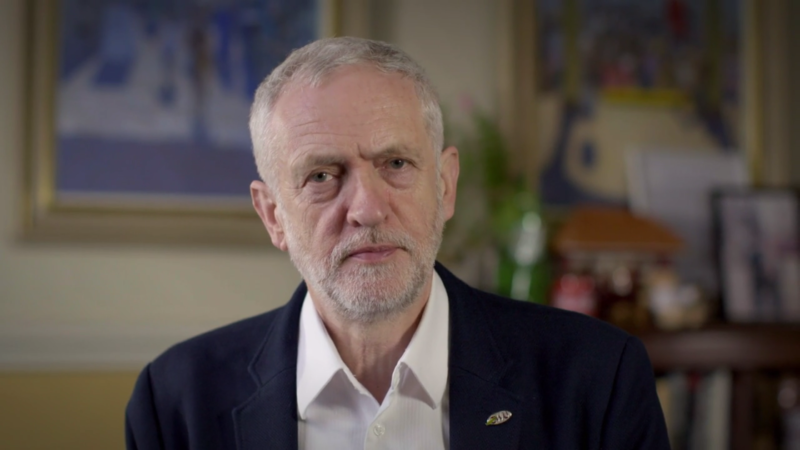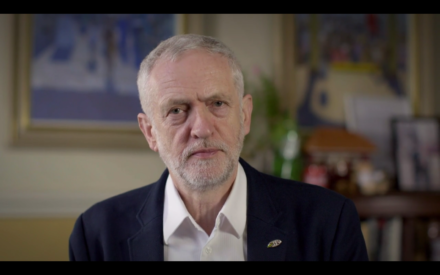

The lengthy piece by Danny Dorling published last week deserves a detailed reply.
He starts by saying:
“It is accepted wisdom that for a party to be elected in a first past the post two-party system it has to appeal to swing voters, particularly those in marginal seats. As a result the two main parties have vied for the centre-ground. Consequently, in recent decades a large section of the electorate came to see little to choose between them. People have also come to believe that you cannot trust politicians.
Distrust increases if politicians clearly behave in ways that are motivated to maximize votes, rather than appear driven by conviction.”
We tested an alternative approach of mobilising our base and not appealing to the centre ground in 1983 and to a lesser extent in 1987. Both resulted in heavy defeats. The relatively weak polling and council election performance now even compared to the equivalent period under Ed Miliband suggests movement further to the left is already having a similarly negative effect.
Alternative strategies were set out during the leadership election making claims about mobilising and enthusing previously non-voting leftwingers. This strategy has yet to deliver any polling or electoral dividend and is flawed because:
– Non-voters are generally not interested in politics rather than likely to be enthused by more extreme politics. The polling evidence is that if they could be bothered to vote non-voters would have similar political views to the rest of the electorate, not be particularly attracted to leftwing policies. Hence Labour held almost all its vote share and seats even though the turnout collapsed between 1997 and 2001.
– Non-voters are disproportionately from demographic groups located in safe Labour constituencies where increasing their turnout ups Labour’s majority in that seat but has no impact on winning a Commons majority (even if you don’t win by winning over swing voters you still need to gain swing seats off the Tories). Logic suggests people to whom leftwing policies appeal in general (whether they already vote or not) are disproportionately likely to live in seats we already win.
– The campaigning effort required to get non-voters to the polls is huge because many of the impediments to them voting are physical (e.g. young people and private renters who have moved house and failed to register at their new address) not political. This approach was abandoned during 2010-2015 for this reason.
– The maths makes it daft to prioritise this group of electors. Every voter gained direct from our main competitor in a seat (usually the Tories) has a double effect (reducing the Tory vote by 1 as well as adding 1 to our vote) so you need to mobilise two previous non-voters for the same effect. And the swing voters already by definition vote so you only need to politically attract them, not drag them out to vote.
– Designing policies to appeal to imaginary leftwing non-voters may have a net negative impact as those policies may repel swing voters including ones who were still voting Labour in 2015.
Danny suggests voters are right to see little to choose between the main parties. But this assertion ignores the reality of the huge policy differences between what Labour and the Conservatives have proposed in any recent election, however centrist Labour has been. In 1997 the Tories aggressively opposed the minimum wage. In 2005 they proposed £36 billion less in public spending at a time when we were investing massively in schools, hospitals, policing and improving social housing. In 2010 Labour had promoted a vigorous Keynesian response to the 2007 crash, injecting extra public spending into the economy to save jobs, whereas the Tory agenda was austerity. In 2015 we would have abolished the Bedroom Tax, reduced the scale of cuts facing public services, and invested in building 200,000 new homes.
He implies moderate Labour politicians are driven solely by vote-chasing electoral considerations when in fact they actually believe centre-left policies to be morally correct and better policy solutions which are electorally popular because they are the right thing to do. Does he really think Tony Blair wasn’t a conviction politician?
Danny cites Tariq Ali’s claim that Labour was “unlearning social democracy”. Tariq Ali is one the world’s most famous revolutionary Trotskyists. Ali has no qualification to judge Labour’s proximity to social democracy as it isn’t an ideology he believes in.
Tony Crosland also gets cited, which is odd as Crosland was the guru of Labour’s revisionist moderates in the 1950s and wanted to make us a more centrist and less class-orientated party, at comfort with the consumer society, with a socialism based on redistribution not public ownership, i.e. the opposite of the Corbynite agenda. The idea that Corbyn is a revisionist social democrat when his political tradition saw the Tribunite left like Bevan and Foot as sell-outs, let alone Crosland and Gaitskell, is bizarre.
The article seems to make a lazy assumption that there are only two possible paths for Labour – Blairism or Corbynism. It fails to differentiate Blairism from Brownism or the soft left approach tried by Ed Miliband, or spot that there might be other paths forward for Labour.
As well as non-voters Danny suggests we go after the supporters of minor parties. Clearly in Scotland we must win votes back from the SNP to regain seats from them. In England though there is a gap of 2.4 million votes between Labour and the Tories and only 1 million Greens and 32,000 TUSC voters. Even if all of the small parties to our left disappeared we would still face a 1.4 million gap behind the Tories. And the voters for these small parties don’t tend to live in seats that decide General Elections. Like both me and Danny they live in seats like Oxford East that are already Labour. Going after these votes is just a doubling-down on Ed Miliband’s failed 35% strategy of believing he could eat up the Lib Dem vote in order to avoid difficult policy decisions to attract Tory and UKIP voters.
It is noteworthy that Danny doesn’t seem to include UKIP voters among the groups we should target, as they are unlisted in the list of parties that “people who sometimes vote Labour … also see good in” when in fact one of the largest groups of lost Labour voters is people who have moved to UKIP.
His call for Labour to develop an “understanding of where the ten constituencies in England are where the Green’s could do better than Labour and where it would be good if they focussed almost all of their efforts in a future general election” is nonsensical as eight of the ten seats where the Greens poll best already have Labour MPs – there are no seats they could take off the Tories to contribute to a red/green victory. Corbyn’s election, we were promised last summer, would mean everyone gave up voting Green and came over to Labour. It wasn’t supposed to mean we had to do a deal with the Green Party, we were supposed to have destroyed its raison d’être. Instead what happened is that tens of thousands of Greens voted in our leadership election and gave us an unelectable leader to their taste, then carried on voting Green.
Danny claims “clever Conservatives fear Corbyn because a Labour party lead by him or people like him would undo their what they have done.” In fact the Tories are laughing at us to our faces.
He suggests Corbyn’s critics hate him. We don’t. There is widespread affection for Corbyn the man as someone who unlike the Stalinist goons and Trotskyist fixers around him is not personally vindictive.
But Danny’s claim that this saintly figure stands for “conviction, love and compassion. Just how cynical do you have to be not to see the hope and possibility in that?” sounds hollow to anyone who has scrutinised his blind solidarity with certain repressive regimes and terrorist groups, his failure to speak out clearly enough or take swift action against repeated cases of antisemitism in the party, or his failure to draw a line and say that revolutionaries who do not believe in parliamentary democracy do not belong in our democratic socialist party. The problem with Corbyn is not so much the moral clarity Danny lauds but that he lacks moral clarity on many major issues, though the experience of Michael Foot suggests British voters are more worried about their bank balance than the morals of their potential leaders anyway.
What we hate though isn’t our own leader, it is living under a Tory government that is getting a free run at destroying our public services, our remaining manufacturing base and the living standards of our most vulnerable citizens because Labour has embarked on promoting the crank policies like nuclear disarmament that appeal to the leftwing half of our own membership – and a cynic might say are deliberately designed to provoke resignations by moderates, thus tightening the left’s grip on the party – rather than listening to ordinary voters and finding out the kind of centre left agenda that they would be enthused about.
It is delusional to believe that you can construct a centre left government in the UK based on our own prejudices and fantasies and without any reference to the hopes and fears of the 15 million people who voted Tory or UKIP (or even the millions of Labour voters who don’t share Corbyn’s world view).
If Corbyn had the same politics but the charisma of an FDR, JFK, Blair, Bill Clinton or Obama it would be an interesting but high risk electoral experiment.
As it is, it is the political equivalent of the Charge of the Light Brigade – wrong strategy, wrong tactics, wrong target, wrong leader, result electoral slaughter.
Danny asserts that “what Corbyn really represents is a set of beliefs whose time has finally come”. I prefer to base my views on what the political zeitgeist is on the hard evidence of elections, polls and doorstep conversations. Corbyn’s ideas were wrong and out of date in 1983 and they are 30 years more stale and redundant now.
The tragedy is that the hardened cadres and cynics around Corbyn know this, but they have absolutely zero interest in developing any kind of strategy to beat the Tories. Their only priority is to secure their control inside the Labour Party. They rely on well meaning but politically naive commentary from people like Danny to maintain the facade of some passing interest in the election of a Labour government.
Those of us who can see what is being done to the Labour Party have a moral duty to call it out for the destructive nonsense it is.
This has to end, the sooner the better.




More from LabourList
Economic stability for an uncertain world: Spring Statement 2026
‘Biggest investment programme in our history’: Welsh Labour commit to NHS revamp if successful in Senedd elections
James Frith and Sharon Hodgson promoted as government ministers